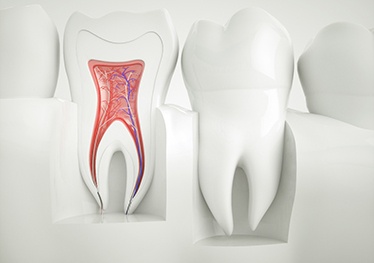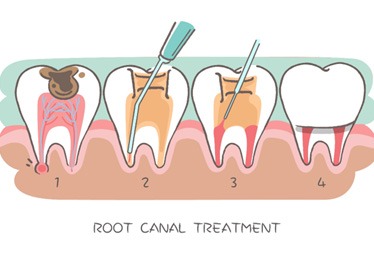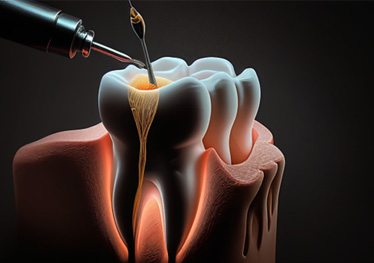
Root Canal Treatment – Garland, TX
Proven Solution for Hurting Teeth

Most of the time, cavities only affect the outermost surface of a tooth called the enamel, but left untreated, it can eventually reach the sensitive nerve tissue located inside every tooth called the dental pulp. When this happens, severe dental pain is usually the result. If you’re dealing with this kind of toothache, our team can provide the care you need in the form of root canal treatment. With it, we can quickly stop the pain and save the tooth from extraction in the process. Ready to make your tooth stop throbbing? If so, give us a call today!
Why Choose Dentistry by Brand for Root Canal Treatment?
- Same-day appointments available for patients in pain
- Safe procedure that consistently provides quick relief
- Patient comfort is priority #1
The Myth of Root Canals

Most people know only one thing about root canal treatment: it’s extremely painful, right? Fortunately for our patients, this couldn’t be further from the truth!
In reality, the procedure causes little to no sensation thanks to local anesthesia and our team’s experienced hands. Often, it’s the pain caused by the dental infections that root canals help treat that is wrongly associated with the procedure itself. Here, our patients say that the treatment actually feels like just getting a small filling, which is to say not painful at all!
Do I Need Root Canal Treatment?

Patients often think that severe tooth pain is the only symptom of a severely decayed or damaged tooth. That’s not the case. In fact, if the infection progresses to the point where it “kills” the nerve, you may not feel any discomfort! That’s why it’s so important to get in touch with us when any abnormal dental symptoms arise, like pain when biting down, a pimple-like bump on your gums, or dark discoloration on one or more of your teeth. This will ensure that we can intervene with the necessary emergency dental care while we can still save your tooth.
The Root Canal Process

The root canal treatment process starts with a local anesthetic (or sedation dentistry, if that’s a part of your treatment plan). Once your mouth is thoroughly numb and you’re ready to begin, one of our gentle Garland dentists will use special instruments to remove the pulp of your tooth. Then, they will carefully sanitize the area, fill it with a synthetic gutta-percha material, and place a temporary dental crown over top. The final step of the entire process will take place a few weeks later, which is when we will remove your temporary crown and put your permanent one in its place.
The Benefits of Getting a Root Canal

Hands down, one of the biggest benefits of root canal treatment is that this procedure can save your tooth, preventing you from having to get it extracted and replaced with a dental bridge or implant. Additionally, patients find that this procedure is so painless that it basically feels like having a standard filling done. Lastly, this tooth-saving treatment has an incredibly high success rate, allowing patients to enjoy the results for decades at a time.
Understanding the Cost of Root Canals

When you’re dealing with a toothache and desperately need a root canal, you’re probably uncomfortable enough already without adding in financial stress. For that reason, we make it as easy as possible to pay for your dental care.
Part of that comes from having a solid understanding of what you can expect from the cost of your root canal. While we won’t be able to give you a complete estimate of what your treatment will cost until we meet you in person, here’s what you should know about what root canals generally cost in the meantime.
Factors That Can Affect Root Canal Cost

There are several factors that can influence the cost of a root canal in one way or another. It’s impossible to say with certainty what you’ll pay for your procedure until we meet you in person, but you considering the following conditions can help you to get a better sense of what to expect.
First of all, some teeth have more tooth roots than others. Molars have three, while incisors have only one. This means that the former are more complicated to treat, and therefore more expensive. In some circumstances, the procedure may become so complicated that a specialist needs to be brought in, which will entail greater costs.
Root canals are often concluded with a restoration to fill the hole opened in the tooth. The cost of any dental crowns you need should also be considered.
Is it Cheaper to Pull My Tooth?

When looking only at the cost of the treatment itself, it may initially appear like root canals are the more expensive way to deal with an infection. However, this neglects a crucial part of a tooth extraction—replacing what’s been removed.
If you leave a gap in your smile, this could cause more than just aesthetic problems. Even missing a single tooth can impair your ability to speak clearly, or to chew your food properly. The tooth surrounding the gap may also move out of alignment, giving you a crooked or spacey smile.
For these reasons, we strongly recommend replacing a tooth that’s been removed with either a dental bridge, denture, or dental implant. If you consider this cost along with the price of the extraction, root canals suddenly become the much cheaper option.
Does Dental Insurance Cover Root Canals?

Root canal therapy is a major procedure done to treat serious oral health problems. For that reason, they’re usually well within the realm of what will be covered by dental insurance. Depending on the details of your plan, you can often expect dental insurance to pay for anywhere from 50-80% of the cost of your treatment.
Other Options for Making Root Canal Therapy Affordable

If you don’t have insurance, we still want you to be able to get the care that you need. We’re currently offering a special for uninsured patients—you can get $100 dollars off any procedure that you get from us, including your root canal.
We also frequently work with financing firms like CareCredit, which can help you to split the cost of your treatment into manageable monthly payments. You may even qualify for a no-interest six-month financing plan. Give us a call, and we’ll talk to you about what kind of options could be available for you.
Root Canal FAQs

Before getting one or more dental crowns, you may wonder about how much money it will cost. Unfortunately, until we’ve had the opportunity to put together your treatment plan, we can’t give even a ballpark estimate because we don’t treat each unique patient with cookie-cutter services. For the best financial information about crowns, ask us in person when you come for your appointment.
How Long Do Root Canals Last?
Root canals have a very high success rate. Most teeth that are treated with one go on to provide full chewing function for many years. The longevity of your root canal depends on a variety of factors, including the extent of the damage and how much time went by between the placement of the temporary and permanent crown. To help your root canal last for as long as possible, you should closely follow the post-op instructions provided to you by your dentist.
How Long Does a Root Canal Take?
Root canals can usually be completed in a single appointment. The length of your root canal can take anywhere from 30 to 90 minutes or more. This depends on the location of the tooth in the mouth. Molars tend to take longer because they have more root canals that need to be disinfected than front teeth. Generally, the further back in the mouth you go, the longer your root canal will take.
What Happens if You Wait Too Long for a Root Canal?
Unlike the rest of the body, teeth are unable to heal themselves. An infected tooth will only worsen if you don’t seek treatment, so you should schedule your root canal as soon as possible after your dentist informs you that one is necessary. Sometimes, the pain in a tooth will go away, making the patient think that they no longer need a root canal. However, this is actually an indication that an infection has destroyed the nerve of the tooth. If you wait too long to have a root canal, the infection could spread to other areas of the mouth and body. Your tooth can also become so damaged that it needs to be extracted.
Do I Need Antibiotics Before or After My Root Canal?
Most patients don’t need to take antibiotics before or after getting a root canal. You will likely only need them before a root canal if you have a health condition that increases your risk of developing an infection after a major dental procedure. We will go over your medical history with you beforehand to determine whether prescribing antibiotics for you is a good idea.